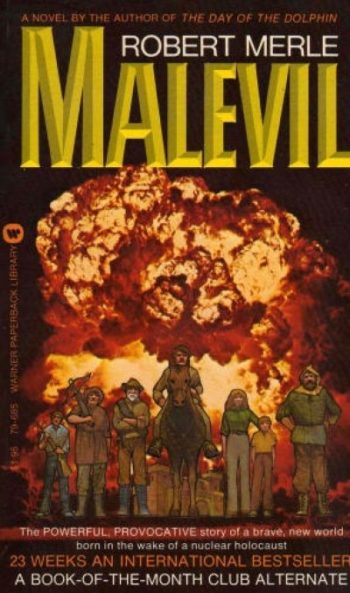 By ROBERT MERLE (Warner Books; 1972/75)
By ROBERT MERLE (Warner Books; 1972/75)
Believe me when I tell you that this 1970s relic is one of the absolute best after-the-bomb novels in existence. MALEVIL‘s author was France’s Robert Merle, of THE DAY OF THE DOLPHIN (which appears destined to be known primarily for the bad movie adapted from it, as for that matter does MALEVIL in some circles), with English translation by Derek Coltman. Both do superlative work in a near 600 page epic you won’t want to end.
…superlative work in a near 600 page epic you won’t want to end.
Admittedly, the novel takes some time to really get going. The first hundred pages are taken up with necessary but not always invigorating scene setting and character development (things that nowadays would be doled out via flashback). Yet once the “clean” (i.e. airborne) nuclear explosion that provides MALEVIL’S reason for being occurs, it becomes an irresistible page-turner.
The setting is Malevil, a castle located in a remote region of France. It’s there, in the wine cellar, that the novel’s fortyish narrator Emmanuel and his friends are situated when the explosion occurs, in a truly horrifying passage that sees the temperature of the cellar increase to Hellish degrees, nearly frying everyone within. They survive, though, to face a devastated countryside where stone-age survival predominates.
… once the “clean” (i.e. airborne) nuclear explosion that provides MALEVIL’S reason for being occurs, it becomes an irresistible page-turner.
The struggles of Emmanuel and his companions are never less than thoroughly convincing, barring some overly convenient and coincidental elements (such as the introduction of a flirtatious young woman into Malevil’s largely male populace). Particularly well conveyed is the passage of time in this environ, which is languid yet pregnant with hidden danger.
There are no mutants or giant insects in this novel’s post-apocalyptic landscape, and politics are also jettisoned (we never learn who set off the bomb, nor what happened to the world outside Malevil’s immediate surroundings). There are, at least, other surviving humans afoot, and of course not all those survivors are friendly.
MALEVIL would likely be branded politically incorrect today with its presentation of the near-inhumanely strong and resourceful Emmanuel using his manly wiles to keep his fellows in order. Merle, however, subtly undercuts Emmanuel’s boastful narration through italicized passages by his friend Thomas that provide an entirely different perspective. It’s Thomas, in fact, who concludes the novel; no fair telling how, but I will reveal that the conclusion is quite moving and, in keeping with the preceding events, unerringly true to life.
See Also EIGHTIES NUKE MOVIES.
